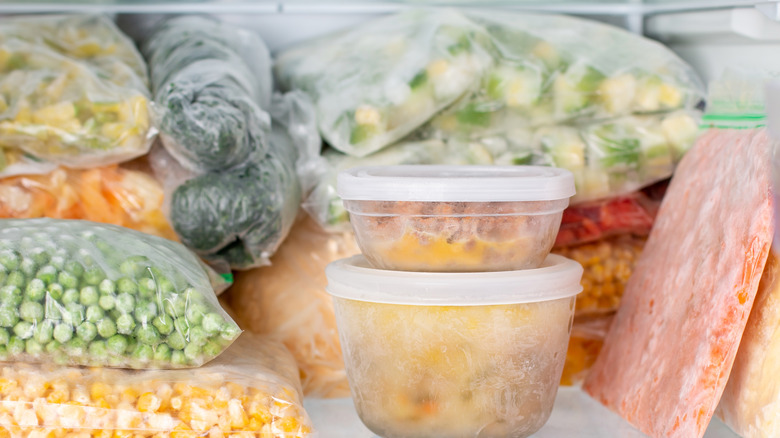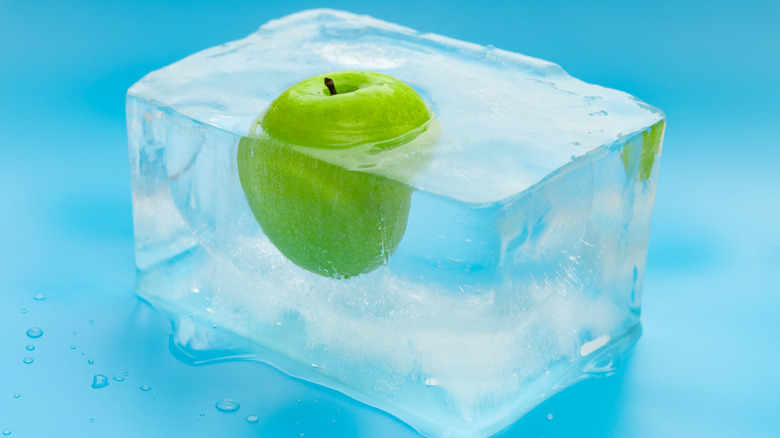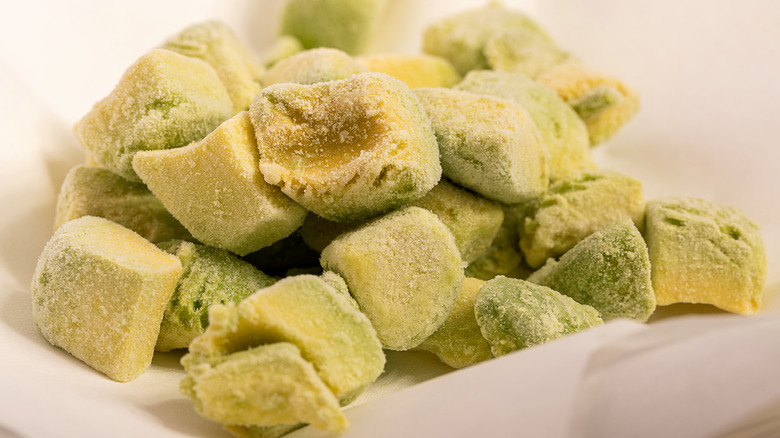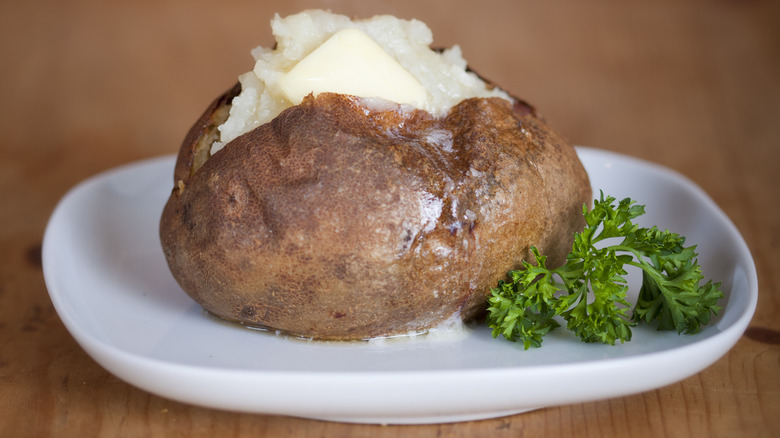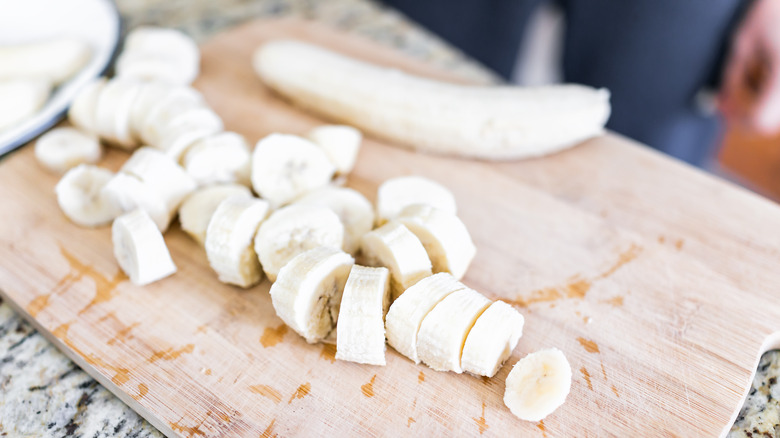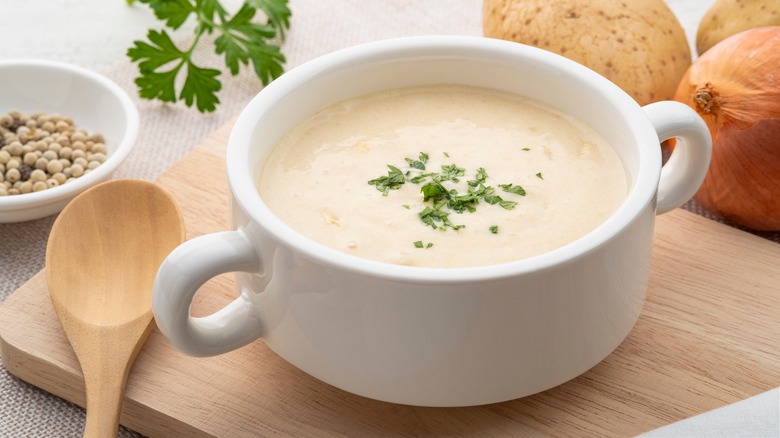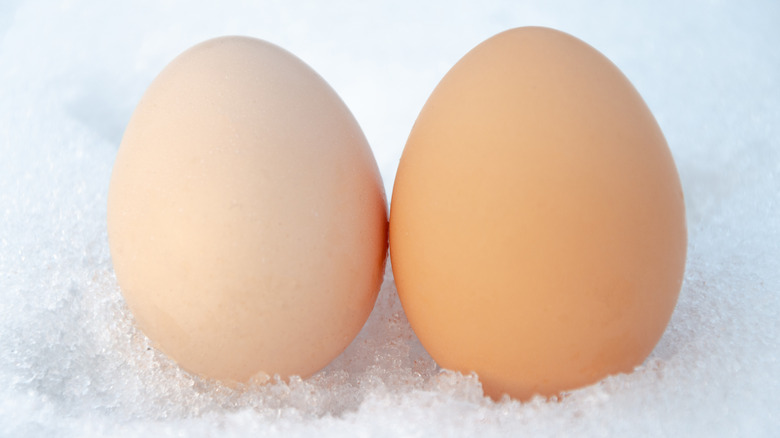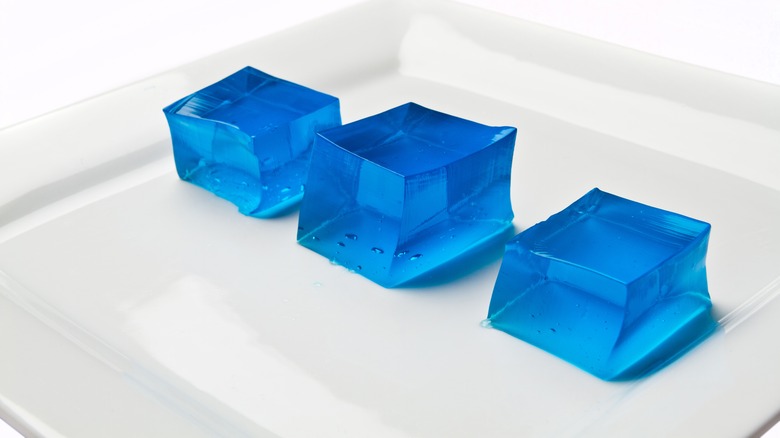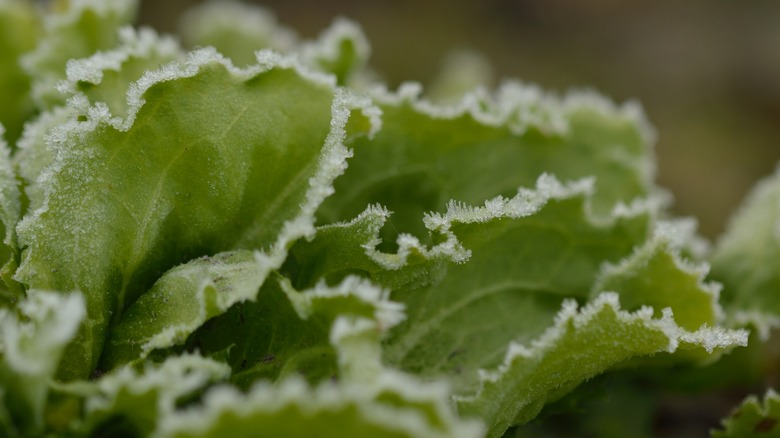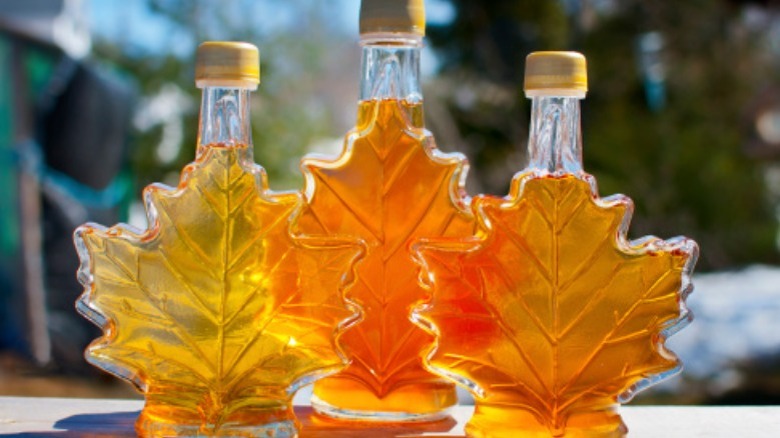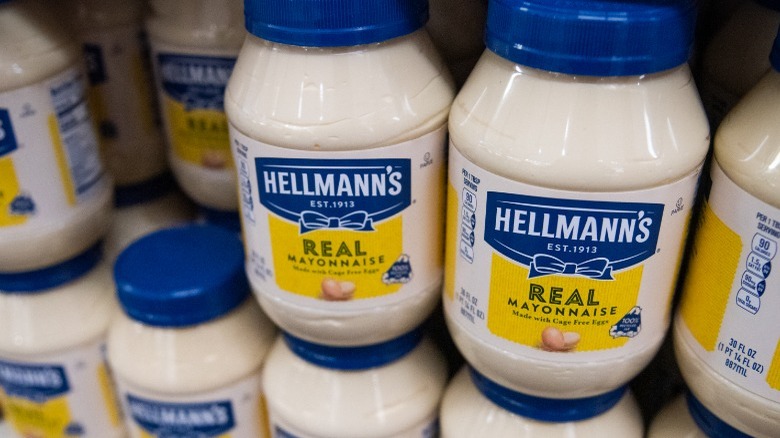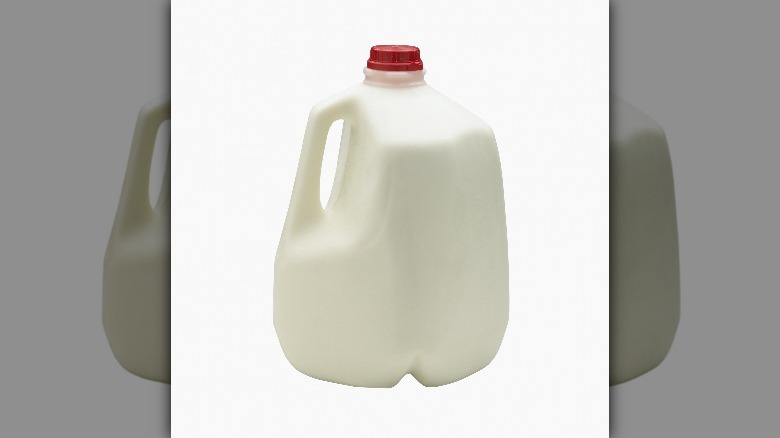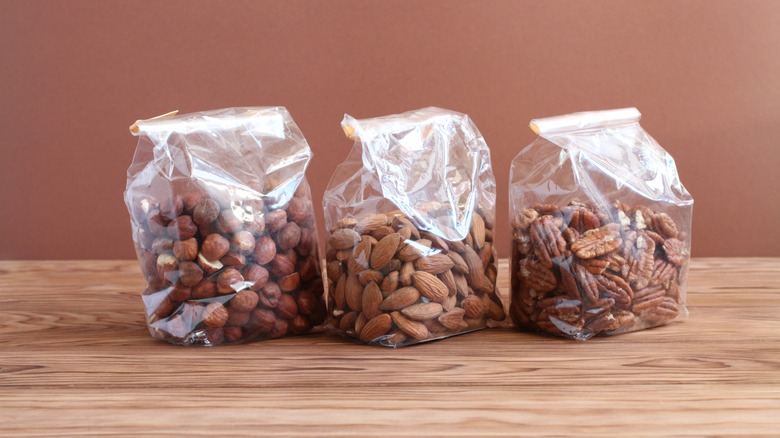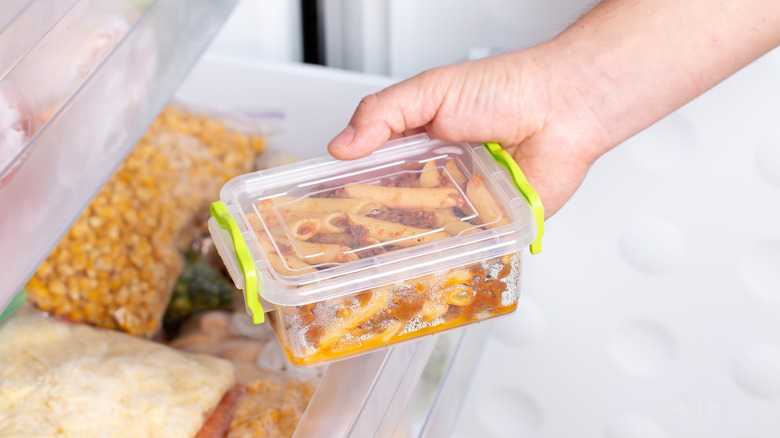What Really Happens When You Freeze These Foods
The freezer may be our favorite appliance. After all, where would we be without this wonderful machine? If you live in a northern climate, you may be able to store your food outside in the wintertime, but who's to stop animals (or neighbors) from walking off with it? Plus, we want our ice cream in summer, too, not to mention the opportunity to store all our bargain buys every time we over-shop at the grocery store. That being said, not all foods can be frozen ... or can they?
Yes, technically, anything can be frozen, although as you probably know if you ever stuck a can of soda or beer in the freezer to chill it and then forgot about it, sometimes the results aren't quite what you'd wish. Still, with most of the foods listed below, there are certain circumstances in which you may want to freeze them, depending on your plans once they thaw out.
Before we get started, though, a quick note on freezer storage times. While you may see recipes recommending that certain foods only be frozen for a few months, FoodSafety.gov says these guidelines only indicate possible deterioration in quality. No matter how long you store your food in the freezer — years if you like — it should pose no health or safety risks (unless you drop it on your toe while it's still frozen, that is).
Apples
Apples have a fairly long shelf life, as Healthline says they're good for a few weeks at room temperature and may last up to two months in the refrigerator before they start getting wrinkly and soft. Even so, if you've ever gone apple-picking in the fall and been a little over-enthusiastic, you may know the pain of having your apples go off before you can eat them or use them up. (One can only bake so many pies.) While you may not think of apples as something that can be frozen, HGTV says it's possible.
The first thing to realize before you pop those apples in the freezer, though, is that once they come out, they should be used for cooking purposes only. The texture will be very different, since, as ScienceDirect explains, when the water in the apples freezes, the cell walls burst. This means that once the frozen apples thaw, they no longer have much crunch. Heat takes the crunch out, too, though, so formerly frozen apples are fine for pies and applesauce. It's not advisable to freeze apples whole, though, as they can be a pain to prepare. Instead, it's better to core and slice them (and peel them, if desired) before freezing. Spread the chunks or slices out on a baking sheet and freeze them until they're solid, then store the apple pieces in a Ziploc bag or airtight container.
Avocados
Should you freeze avocados? Avocados from Mexico is adamant that you must never even think of doing such a thing, insisting that whether you freeze them whole, sliced, or in the form of guacamole, both their texture and flavor will be irrevocably altered for the worse. Even mashed avocados, the organization says, will come out dry, gritty, and bland when thawed. When evaluating information, though, you should always look for bias, and in this case, Avocados from Mexico is in the business of selling more avocados, so of course they're rather you buy new ones to replace any that might have passed their prime in your refrigerator.
Food Network, which is in the business of selling TV programming and has no special stake in avocados per se, says it's perfectly okay to freeze either mashed or whole avocados. Mashed ones freeze best, they say, recommending you mix the puree with lemon juice prior to freezing. Even whole frozen avocados, though, are fine for use in smoothies, sauces, or even on sandwiches as long as these are not open-faced and/or you're not planning on Instagramming them. Not only will thawed avocados be somewhat mushy, but they also won't be the same pretty green hue as their fresh counterparts.
Baked Potatoes
To freeze or not to freeze your baked potatoes — that is the question. Well, it is a question, and it's one where the answer is no ... and also yes, or at least maybe. Let's start with the why not — per Penn State Extension, baked potatoes (or cooked potatoes of any kind) will tend to come out of the freezer much more watery than they went in. This means that your leftover baked potato will have a texture that won't hold up well if eaten on its own.
The reason why you'd freeze leftover baked potatoes, though, is pretty obvious. If you don't, they might go to waste, and wasting food is bad, of course. Perhaps the best way to approach a leftover baked potato is to separate it from any fillings (eat those with a spoon, so long as you can manage a few bites of delicious bacon, cheese, and sour cream), then freeze it in an airtight container or bag. Once the potato thaws out, don't try to revive it as a re-baked potato, but instead use it in a soup or stew or some other dish where its texture won't matter so much.
Bananas
Frozen bananas, at least the kind that have been peeled and dipped in chocolate, are one of our favorite frozen desserts, so yes, bananas are perfectly freezable. Frozen banana slices can make for an even healthier frozen treat, although these, too, can (and should) be dipped in chocolate. So is there any downside to freezing bananas? Not really, as the texture doesn't deteriorate all that much, particularly with the chocolate-dipped kind, and plain frozen bananas can always be used for cooking.
BBC Good Food does offer one caveat regarding freezing whole bananas with the skins on, though — they say it's better not to, as frozen bananas can be difficult to peel. They also recommend that if you're planning to freeze brown bananas (the kind used in banana bread), it's best to peel and mash them first. You should either remember to label the bags (one banana, two bananas, etc.) or else find a banana bread recipe that's specific enough to call for cups or grams of mashed bananas rather than telling you to use a certain number of fruits.
Citrus Fruits
Citrus fruits have a very high amount of moisture, so you'd think they wouldn't freeze too well. This may be true if you're thinking of putting a frozen tangerine in your lunch bag or slicing into a thawed grapefruit for breakfast, as the fruit will probably have an odd texture that in no way resembles that of fresh fruit. If you're planning on using frozen lemons to make lemonade, though, you should be just fine.
BudgetBytes tells us that while citrus fruits can be sliced before freezing, they recommend freezing the fruits whole in a Ziploc bag instead. The reason for this, they explain, is twofold. The first is that the rinds help to keep the fruit from drying out. The second, however, involves a little "twofer" you can get from your frozen citrus — it's quite easy to zest while the fruit is still cold. Once you've zested the frozen fruits, thaw them out for 15 to 20 seconds in the microwave or a quick rinse in warm water, then squeeze out the juice.
Creamy Soups
In many recipes for creamy soups, you may see a warning that you absolutely cannot freeze the soup or dire consequences will ensue. How dire are we talking about here? Not really all that terrible, as it happens — no food poisoning, no smiting by the food gods, and no one revoking your Le Cordon Bleu diploma, either. The worst thing that will happen is that your soup may separate due to the fact that the fat and water in the milk or cream will separate. This may leave your thawed soup taking on what Foods Guy calls a "grainy" texture.
How can you successfully freeze a creamy soup, then? One way is to make it with low-fat cream or milk in the first place, as the lower the fat, the less severe the separation. Another way is to let the soup cool completely before you freeze it. Should you take these precautions and find your thawed soup still separating, though, it's not the end of the world. Iowa State University suggests using an immersion blender to smooth out your soup. Other possible fixes include whisking in a little more cream or milk or adding some arrowroot or tapioca flour mixed with water as a stabilizer.
Eggs
Freezing eggs may sound like an odd idea, but it's one that Healthline assures us can be done. Well, in some cases, that is. They advise against freezing cooked eggs in their shells (these would be hard or soft-boiled ones) as they say that thawed-out egg whites may take on a rubbery texture. Raw eggs in their shells are also a no-no for freezing as the shells might crack when the liquid inside freezes, in which case the United States Department of Agriculture strongly urges you to toss the egg out. Eggshell exteriors aren't always too sanitary, so any part of the inside of an egg that comes into contact with the outside of a shell may become contaminated.
What you can do is freeze raw whites and/or yolks that have been separated, and in fact, it's recommended you do so whenever you come across one of those annoyingly unbalanced recipes that call for half a dozen of one but only two of the other. You can also freeze the whole raw egg (out of its shell, of course), but it's best to whisk the white and yolk together first. If you simply crack an egg into a freezer container without beating it, the intact egg yolk may become too thick to function in a normal, egg-like way once it thaws.
Gelatin dessert
Before we tackle the question of whether gelatin can be frozen, let's take a minute to ponder why you'd even want to do so. Powdered gelatin in a box will last practically forever, and those shelf-stable Jell-O cups are good for over a year. Once you make the gelatin or open the cup, though, the clock does start ticking, so you'll either have to eat it or toss it within a week. Freezing, it seems, isn't something gelatin takes particularly well to.
Robust Kitchen froze several different types of gelatin so we didn't have to, and the results were not positive. Gelatin made from a boxed mix fared worst, as once it thawed out it managed to be both watery and, in their word, "crumbly." The sugar-free kind managed to have an even more unpleasant consistency, for some reason. Jell-O cups actually came out okay once frozen and thawed, but this was likely due to the airtight seal, and as long as this isn't breached, there's little reason to freeze the gelatin in the first place. One instance in which it's ok to freeze gelatin, though, is if you're making it into popsicles, so gelatin that stays frozen is fine — it's the thawing part that makes it yucky.
Lettuce
If you've ever had your produce crisper get too cold to the point where your lettuce freezes, then you'll already know that frozen lettuce will become a nasty, soggy mess when it thaws. It's definitely not something you'll want to use in a salad unless you happen to enjoy them limp and wilted.
HGTV does say, however, that if you ever use lettuce in cooked dishes or in smoothies, the frozen kind will work just fine. Lettuce varieties such as romaine and bibb tend to freeze better than ones with thinner leaves, and ironically, iceberg lettuce doesn't lend itself to being iced. Before you freeze your lettuce, you should separate the leaves, then wash and dry them. Once they're completely dry, protect them with a heavy freezer bag. As an alternative, you could also blend the lettuce with a small amount of water to make a puree, then pour the liquified lettuce into ice cube trays.
Maple syrup
Maple syrup really doesn't need freezing in most circumstances. It's fine at room temperature for a full year as long as you don't open it, but once you do, you can keep it in the refrigerator for another year. Should you happen to be in possession of more maple syrup than you can consume in two years, though, then freezing it might make sense.
One thing you shouldn't do, though, is to freeze an unopened bottle of maple syrup in the original container. Syrup, like any liquid, will expand when it gets cold, and you don't want a mess of broken glass and spilled syrup in the freezer. Instead, it's best to portion the syrup out into smaller plastic containers. That way you can thaw out just one container at a time so you'll be sure to use it up before there's any deterioration in quality. The frozen syrup will thaw pretty quickly at room temperature, too, since it doesn't actually freeze solid. This is because all of the sugar in syrup keeps it slushy even at sub-zero temperatures.
Mayonnaise
Mayonnaise is something that, under ideal conditions, you probably wouldn't want to freeze. That's because once it thaws, the eggs, oil, and acid components will de-emulsify. This means that instead of something smooth and creamy, you'll wind up with something weird and lumpy. While it may be possible to use a mixer or blender to smooth out the thawed mayonnaise, Southern Living warns that it won't be a true re-emulsification and the result will likely be liquidy.
How about freezing mayonnaise that's been used as an ingredient, though? Can You Freeze this says that casseroles with mayonnaise can be frozen just fine, although the mayonnaise part might look a bit weird once it thaws. An extra layer of shredded cheese or breadcrumbs can help cover up any problems, though. If you're looking to freeze a mayonnaise-based dish like chicken or egg salad, the texture won't be ideal when it thaws, although Fanatically Food suggests that stirring in a tablespoon or two of vinegar or lemon juice may help keep the mayonnaise components from separating.
Milk
The problem with milk, unless you drink a whole lot of the stuff, is that it can spoil pretty quickly once it's opened. Even milk that's on the edge of going sour can still be used in cooking, but once milk goes rotten, the only thing to do is to hold your nose and pour it down the sink. So can you rescue milk from this dire fate by freezing it? Yes, you can.
Frozen milk, once it thaws, is probably not something you'll want to drink straight out of the glass, and you may not want to pour it on your cereal or in your coffee, either. The fat will separate and the milk will be lumpy, although Healthline does suggest that a quick spin in the blender can help homogenize the milk to some extent. Frozen milk is perfectly fine for use in cooking, however, and it should be okay in a milkshake, too.
Nuts
There is little, if any, downside to freezing nuts, but we've included them on the list as a public service announcement of sorts. The main problem with freezing nuts is that many of us don't always think to do it, since nuts do last for a while in the pantry. They won't last forever, though, so if you buy a big bag of pecans to bake your famous Thanksgiving pecan pie and then forget all about the leftovers until Thanksgiving comes around again, those year-old nuts will likely be rancid.
If you freeze nuts, on the other hand, their naturally low moisture content means that there will be little to no deterioration once they thaw. While Tropical Foods says that nuts should keep for up to a year in the freezer, bear in mind, this is for "peak freshness" and they won't actually go rancid in there. This means that nuts frozen for two or more years should still be okay to use. Store your nuts in an airtight container, stick them in the freezer, and as long as they don't smell or taste bad whenever you get around to pulling them out, go ahead and use them for baking or any other nut-related needs.
Pasta
When it comes to freezing pasta, we're talking about the cooked kind, of course — dried pasta typically contains zero fat and moisture, so Healthline says it should last for a number of years in the pantry. Cooked pasta, on the other hand, is likely to spoil in anywhere from one to five days in the refrigerator, with sauced pasta tending to last a bit longer.
Luckily, cooked pasta takes quite well to freezing, which can be confirmed by taking a look at the frozen meals aisle in the supermarket. How many TV dinners are pasta-based? Nearly all of them, it seems. Unsauced pasta, particularly if it's a bit undercooked, is the best kind to freeze, but pasta in tomato sauce works well, too. Pasta in cream sauce may not fare as well due to the separation of the cream once thawed, but even if your leftover macaroni and cheese doesn't look too pretty, it will still be perfectly edible. Freezing your leftover pasta, after all, is a much better alternative than letting it go to waste.
